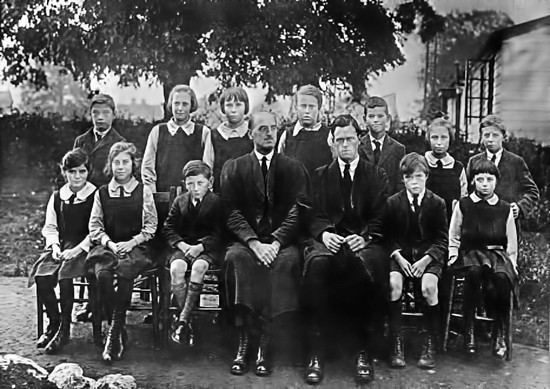|
Charles Pask Matthews 1886-1956
The first headmaster of Bourne Grammar School when it was opened in 1920 was Charles Pask Matthews who was mainly responsible for its establishment as a major educational force in the district, guiding it through the crucial early days and eventually seeing it firmly established with a promising future before he retired in 1945 after a quarter of a century. Educated at Owen's School, London, he chose teaching as a career after graduating with an MA and a BSc degree, both at honours level, science being one of his main preoccupations. He also had an interesting record of military service and was the adjutant of the East Surrey Cadet Battalion circa 1909 while senior master at Tiffin School, Kingston-upon-Thames, Surrey, where he was also the Officer Commanding of the school cadet corps. On the outbreak of the Great War of 1914-18, he was commissioned in the East Surrey Regiment and went abroad with one of the earliest drafts. He was later transferred to the Royal Engineers and then the Royal Army Medical Corps, serving throughout the duration and remaining in Cologne with the Army of Occupation until 1919. After demobilisation, he returned to his former post at the Tiffin School where he became head of the science department and an instructor in mathematics at the local Technical Institute where he also designed several mathematical instruments but in 1920 he moved from Kingston to take over the headship at Bourne Grammar School. His appointment heralded the opening of the grammar school with three other staff and 50 pupils, meeting first in the Vestry Hall because the buildings were not ready for occupation. During the Second World War of 1939-45, he used his administrative skills as joint secretary with another teacher, Mr K Bates, headmaster of Morton Church of England School, of the Bourne and South Kesteven War Weapons Week, a vital organisation in the raising of funds for the war effort, while at the same time serving on the War Savings Committee at Bourne. He was also president of the Bourne Institute and for twenty years served with the Special Constabulary, being awarded the force's long service medal. Mr Pask Matthews was primarily a mathematician and scientist, becoming a Fellow of the Institute of Chemistry and of the College of Preceptors. The institute subsequently appointed him to serve on a national committee formulating the teaching of chemistry in schools and he also became an assistant examiner in the school leaving examinations held by London University and the Central Welsh Education Board. In 1940, he put his extensive scientific knowledge at the disposal of Bourne Urban District Council for the testing of meat affected by poison gas, later performing similar duties for the local authorities at Boston, Grantham, Holbeach and Spalding. Archaeology was his chief recreation and he was a member of the Lincolnshire Archaeological Society, lecturing frequently on his favourite topic of monks and monasteries. He was also interested in the Workers' Educational Association and was chairman of the Bourne branch. Mr Pask Matthews was a worshipper at the Abbey Church where he took a particular interest in the building, writing a short history which became so popular that it ran to five editions and is still the starting point for historians researching the 12th century church. Masonic duties were an abiding interest and he soon became one of the leading members of the craft in Lincolnshire. He was a past master of the Hereward Lodge at Bourne and the Merit Lodge at Stamford, a past provincial Junior Grand Warden for the Province of Lincolnshire and founder of the Grantham Shire Lodge. In the Royal Arch Chapter degree, he was a Past Principal of the Hereward and Montague Chapters and a Past Provincial Second Principal of Lincolnshire and among the positions he held were Past Provincial Grand Director of Ceremonies and past Assistant Grand Director of Ceremonies of England. Also in the Mark Degree, he was Past Master of the Nene Lodge, Sleaford, and the Stamforde Lodge, Stamford, and Founding Master of the St Guthlac Lodge, Market Deeping and he also maintained links with the lodges at Skegness and Grimsby. In July 1938, he was honoured by the Lincolnshire Provincial Chapter of Royal Arch Masons, meeting at Bourne, for his consistent and untiring work for the order over a number of years. In 1951, illness compelled him to have a leg amputated and he then resigned from the post of Provincial Director of Ceremonies for Lincolnshire in the Mark Degree but continued with his other masonic duties as far as he was able. He died at the Butterfield Hospital, Bourne, on Friday 23rd February 1956, aged 70, leaving a widow but there were no children. The funeral service followed by cremation was held at Cambridge the following Tuesday. See also Bourne Grammar School
Go to: Main Index Villages Index
|
